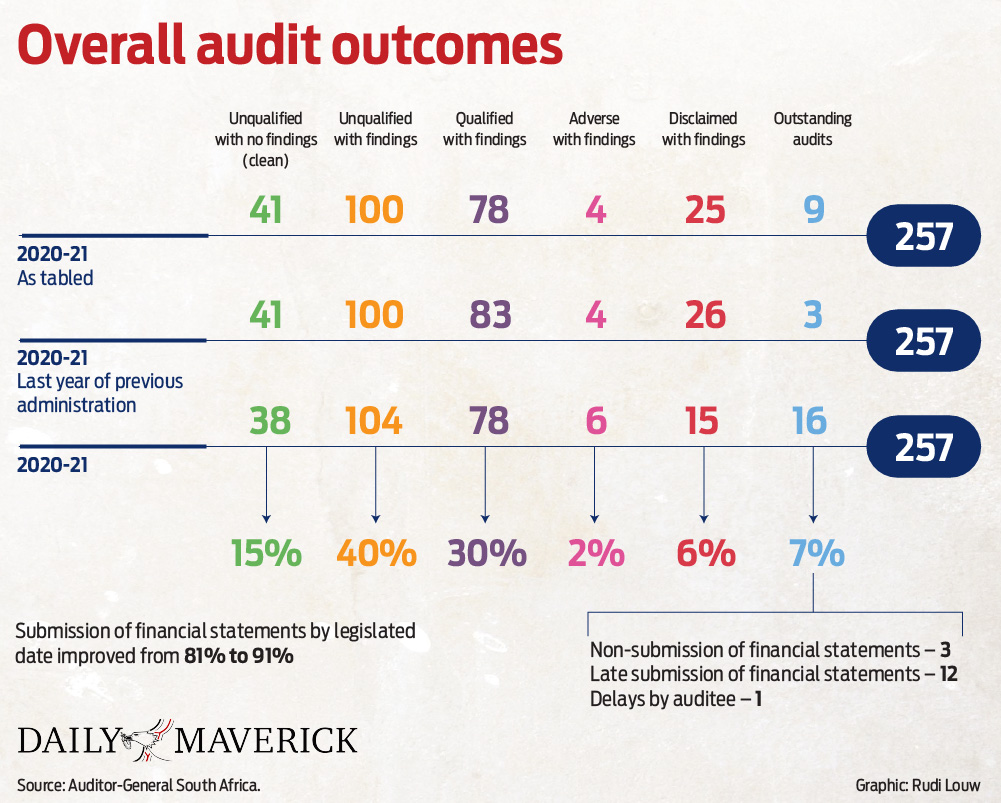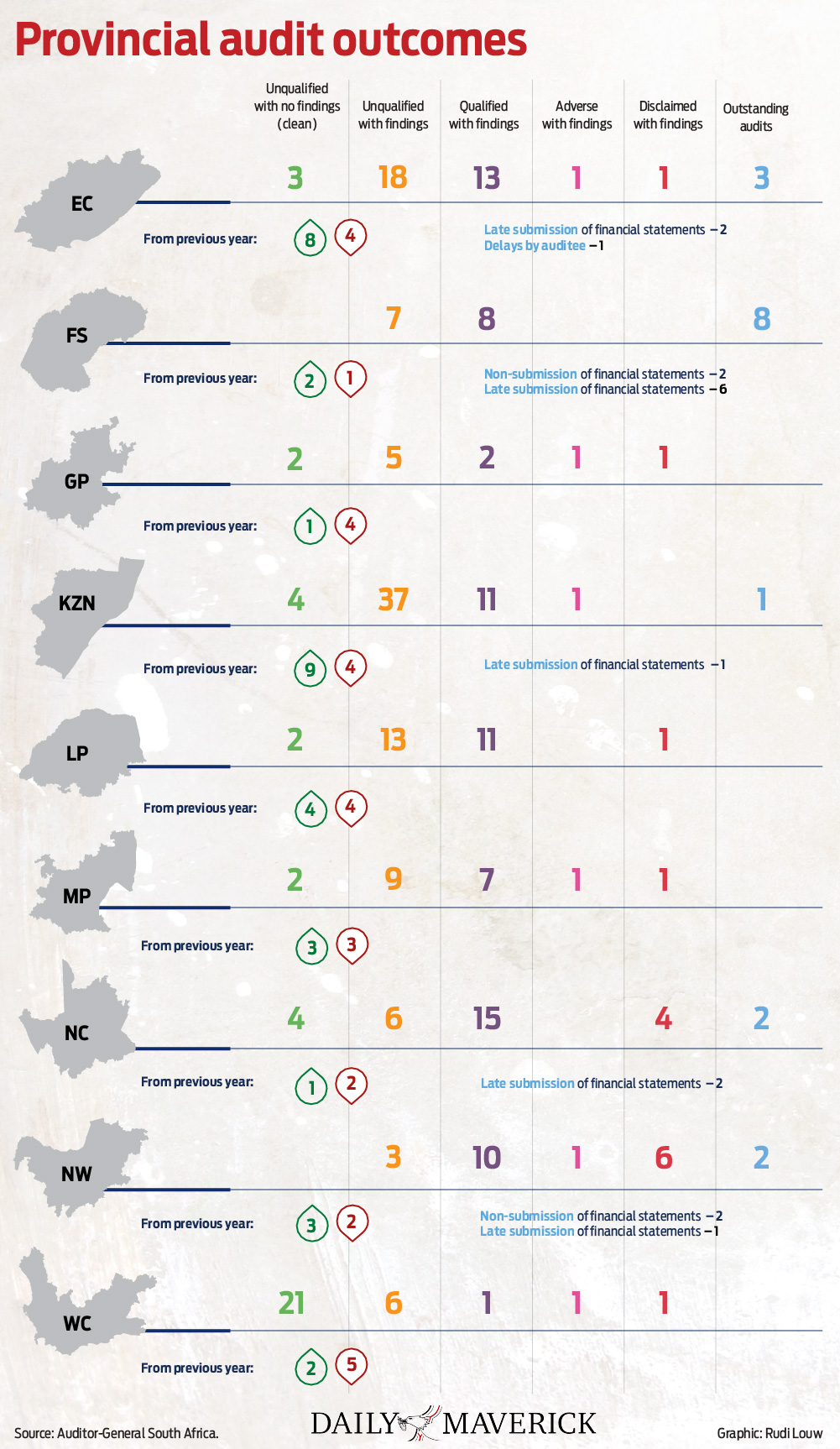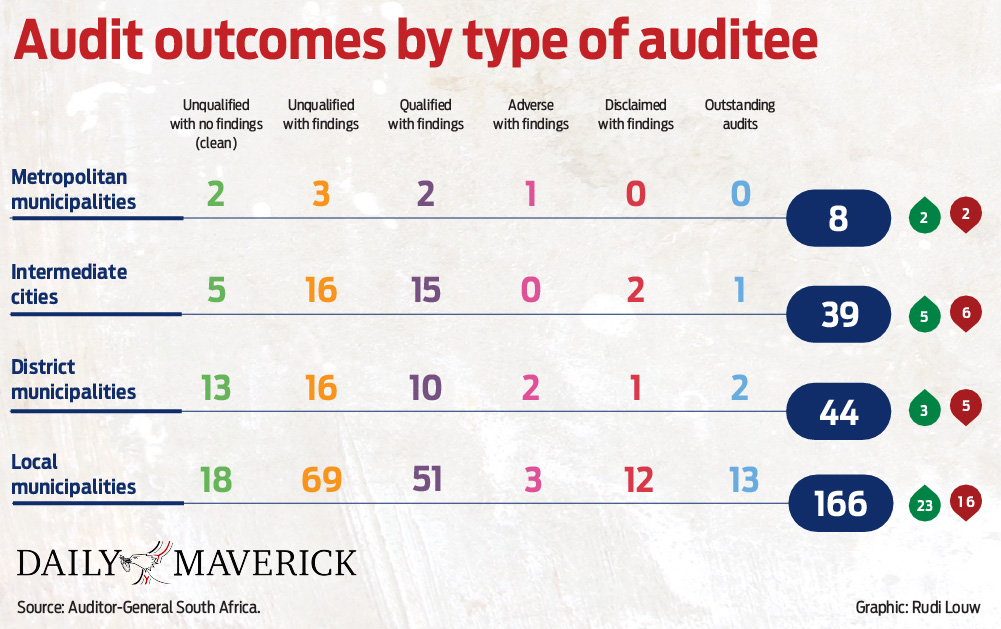VISUAL TAKE: AUDIT OUTCOMES
Local government litany of woe — municipal decay and its dire consequences for service delivery

The Auditor-General (AG) has released the 2021/22 municipal audit outcomes, with only 38 municipalities receiving a clean bill of health — a further decrease from the previous reporting period. The deterioration in local government institutions has far-reaching implications on service delivery, says the AG.
‘Over many years now, local government institutions have continued to deteriorate. We see the impact of this in the delivery of services on the ground, we see it in the continued deterioration of infrastructure, we see it in the continued inability to put projects on the ground, and we see it in the trust deficit that grows between local governments and the people that they serve.”
These were the words of South Africa’s Auditor-General (AG), Tsakani Maluleke, who on Wednesday presented her office’s findings on the 2021/22 local government audit outcomes to Parliament’s Standing Committee on the Auditor-General (Scoag).
The AG’s previous report for 2020/21 was aimed at the new administration — the new mayors, speakers and councillors elected to represent and serve their communities. Her latest report is themed “A culture of accountability will improve service delivery.”
The Auditor-General’s 2021/22 report:
“Our major insight now is that it is urgent that there be attention to building stronger institutions at a local government level. Attention by those who have been elected and appointed to run those institutions, but also other players in the accountability ecosystem,” she told Scoag.

In 2021/22, only 38 out of 257 municipalities in SA had clean audits. This is a decrease from the previous reporting period, 2020/21, when 41 municipalities received clean audits.
Only two metros received clean audits: Ekurhuleni and the City of Cape Town.
The Western Cape retained its spot as the province with the highest number of clean audits. Out of the 38 municipalities nationally which received a clean bill of health, 21 are in the Western Cape.
The Free State and North West did not receive any clean audits and have a history in this regard.
Below is a breakdown of the number of clean audits (in green) per province:

KwaZulu-Natal and the Eastern Cape are the two provinces that Maluleke said had “improved significantly”. However, she added, the transition in many councils after the November 2021 municipal elections had created greater instability in several auditees, which further contributed to the deterioration of these public institutions.
“There is a deterioration if you look right across the board, so even in those provinces where you’ve seen some improvement, there is some concern that that improvement is not coming at the type of pace or the type of impact that’s required to turn the tide of deterioration of local governance,” she said.
The AG noted that local government had been characterised by dysfunctional municipalities, poor financial management, council instability, a swell in municipal vacancies and decaying municipal infrastructure. All this chaos combined, “leads to deteriorating standards of living and service delivery failures, resulting in service delivery protests”.
She called the deaths from the cholera outbreak in Hammanskraal, “a harsh reminder of the impact of continued neglect” at a local government level.
“Incidentally, in that particular instance, we had actually issued a material irregularity on that Rooiwal wastewater treatment plant,” she said.
Read more in Daily Maverick: Government seemingly still in the dark about source of deadly cholera outbreak

Fruitless and wasteful expenditure
“With growing financial pressure, we would’ve expected municipalities to exercise much greater prudence in how they’re spending the resources that they do have — we’re not seeing that. A key indicator would be the ongoing growth in the levels of fruitless and wasteful expenditure,” said Maluleke.
In 2021/22, municipalities incurred a whopping R4.74-billion in fruitless and wasteful expenditure. This has sharply increased from 2020/21, when R1.96-billion in fruitless and wasteful spending was reported.
Financial losses associated with non-compliance, fraud and material irregularities that Maluleke’s office identified, stood at R5.19-billion. The AG also identified 199 municipalities (83%) which have unfair or non-competitive procurement practices.
“The procurement area remains a site of leakage for far too many municipalities,” she said.
“Sometimes, when we arrive at an audit and we ask for documentation to confirm the procurement processes which led to particular decisions, we don’t get that documentation given to us. It should worry all of us. There should be absolutely no public institution that’s unable to show how they arrived at a procurement decision.”
Maluleke said her office had noted that some employees and councillors were still benefiting from the procurement of goods and services in local municipalities. For this, she said, material irregularities had been issued. The AG also told MPs that proper management of available funds would leave more money for service delivery.
Municipalities with disclaimed opinions
Fifteen municipalities (16%) received disclaimed opinions — the worst audit opinion a municipality can get. Disclaimers, according to the AG report, also mean people living in these municipal areas are “robbed of service delivery”.
However, this is a decrease from 2020/21, where 26 municipalities received disclaimed audit opinions.
“We’ve had a reduction in the number of disclaimers, which tells us there are a number of leaders in local government, and also in provincial government, that are heeding the call to deal decisively with disclaimers,” said Maluleke.
The Northern Cape and North West shared the bulk of the disclaimed opinions, with four and six, respectively.
The delivery of basic services that people are entitled to — including clean water and sanitation — cannot be delivered without sufficient and functioning infrastructure, said Maluleke.
“It should come as no surprise that infrastructure neglect, combined with poor financial and human resource management and general governance and accountability failures negatively affect residents’ quality of life at disclaimed municipalities,” she said.
According to the AG report, the main reasons for the deteriorating state of disclaimed municipalities are:
- Vacancies, inadequate skills and instability affected the effectiveness of management functions and managers’ ability to perform their duties;
- Councils not exercising adequate oversight of their administrations and failing to hold them accountable when they failed to fulfil their obligations;
- No signed performance agreements or performance management policies and procedures; and
- Not all disclaimed municipalities received the necessary support and intervention from the provincial government.
“In 2021/22, the 15 disclaimed municipalities paid consultants R128.76-million — either using them to bridge vacancy gaps or because their finance units lacked technical skills. Ten of these municipalities derived little benefit from using consultants due to poor project management and a lack of proper record keeping,” said Maluleke.
Consultancy boom
In 2021/22, municipalities spent R1.61-billion on consultants to help with financial reporting — an increase of almost a fifth, from R1.36-billion in 2020/21. Additionally, 220 out of 257 municipalities used consultants, and 216 municipalities alone spent R1.55-billion on their services. Many municipalities continued to rely heavily on consultants for the most basic tasks, Maluleke said, and had not implemented plans to use consultants effectively or transfer skills.
“The amount municipalities spend on consultants increases every year, and most municipalities (48) relied on consultants to prepare and review their financial statements, even though in most instances they had appointed officials to perform these functions,” she said.
Maluleke said her office had been forced to issue material irregularities to several municipalities for the ineffective use of consultants.
“We’ve issued no less than 11 material regularities where we’ve identified there’s been an inappropriate spend on consultants,” she said.
DM


















 Become an Insider
Become an Insider
Is it not the case that, in the “bad old apartheid days”, councillors and local government officials acted pro bono, and acted out of a sense of civic responsibility? That they were local people, local business owners and the like, who genuinely wanted to improve their communities?
What we have now is little more than hired assassins, purely in “the game” for what they van get out for themselves, their friends and their party. We need a return to simpler times, more integrity and honesty – and to break these mega cartels down into human-scaled operating units that can manage affairs in their entirety.
We need federalism on the national stage, and the same process of devolution in our municipalities = and accountability, integrity and principles baked into the system – and we need it now.
This is an important article but fails to complete the analysis that is vital for the voting public. And that is to answer the question as to which party runs the clean municipalities and which party runs the corrupt/chaotic ones? Is it because it is too embarrassing to state the obvious? Also fascinating that the Western Cape achieves such good governance despite so few consultants? Or maybe because?
Are Local Councils reducing the size / number of staff in their Finance Departments? What is the justification for the high spend on consultants to help with financial reporting? Perhaps the Local Council Finance departments need to have staff competency audits and /or Council business models need to be reviewed.
It seems that expensive consultants are being used by incompetent and possibly corrupt municipalities, when in fact the staff who are getting paid to do a job they are incapable of doing should be fired and replaced with qualified people
Just vote DA. It’s so obvious.